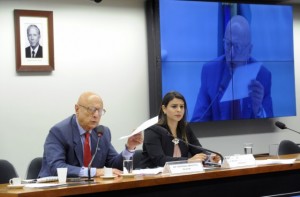CPI Rapporteur on Cyber Crimes excludes controversial point from the report

Proposal could inhibit freedom of expression and generate censorship. CPI work will be extended until the end of the month, to vote on the opinion, which has been criticized by entities that defend the rights of internet users
The rapporteur of the Parliamentary Committee of Inquiry (CPI) Cyber Crimes, deputy Esperidião Amim (PP-SC), will exclude from his report a proposal to compel Internet service providers to remove content offensive to honor, within 48 hours after being notified by the offended.
This proposal had been included by Amin in the report presented last Thursday (31) and received criticism from several entities defending the rights of internet users.
Document delivered to the commission - signed by 48 national and international entities, such as Intervozes (Coletivo Brasil de Comunicação Social) and Proteste (Consumers Association) - states that this proposal could inhibit freedom of expression and generate censorship.
The entities argue that a judicial decision is required to remove this type of content, as already provided for in the Marco Civil da Internet (Law 12.965/14).
Amim will keep in the draft law report only providing for the automatic withdrawal of the content network that were once considered harmful to the honor by the Justice. Thus, a new court order will not be necessary for repeated content, the originals of which have already been withdrawn by the courts. According to the rapporteur, the idea is "not to overload the Judiciary".
Device hacking crime
Another point changed by the rapporteur will be the draft law that expands the scope of the crime of computer device invasion (computers, tablets, cell phones and the like), already provided for in the Penal Code (Decree-Law 2848/40). The initial text even criminalized invasions in which there was no proven damage.
In a new version of the report, which should be presented by tomorrow, Amin will restrict the scope only to “those cases in which the improper access exposes the computerized data to the risk of disclosure or misuse”. The idea, according to the rapporteur, is not to criminalize “hackers for good”.
Currently, the Penal Code considers it a crime to invade someone else's computer device only if the objective of obtaining, tampering with or destroying data or information without the express or tacit authorization of the device holder is proven.
Maintained devices
Other proposals criticized by the defense entities of the internet user were maintained in the CPI report. This is the case with the draft law that allows investigative authorities, such as delegates and prosecutors, to request from the provider the IP address (which allows the identification of the machine) without the need for judicial authorization. The measure only applies to criminal investigations already formalized. However, for the member of the Collective Intervozes Bia Barbosa, this violates the principle of privacy provided for in the Marco Civil da Internet and in the Constitution itself.
Esperidião Amin will also keep in the final version of the draft bill that authorizes the use of funds from the Telecommunications Inspection Fund (Fistel)
for the financing of structures to combat cyber crimes. “There were several criticisms of that, but I am in favor. This was requested by the Public Ministry and the Police, ”said the parliamentarian.
App blocking
Congressman Paulo Henrique Lustosa (PP-CE) is concerned with another draft law proposed by the rapporteur: the one that allows judges to block applications in the case of illegal services. "The concept of illegal services gives scope for unregulated services, innovative services, to be treated as illegal, like Uber," he said.
Deputy Leo de Brito (PT-AC) asked for a dialogue between the members of the commission and the entities that send documents to the collegiate body, criticizing the draft laws proposed by the rapporteur. For the parliamentarian, care must be taken that the principles on which the Marco Civil da Internet is based are respected.
Operating time
The rapporteur reported that his opinion may still undergo further changes. On Thursday (7), the request of the committee's president, deputy Mariana Carvalho (PSDB-RO), approved by the collegiate, requesting the extension of the CPI's operating deadline until April 29.
According to Mariana, although the request is yet to be voted on by the House Plenary, there is already an agreement with the Mayor, Eduardo Cunha, for the extension of the work, with the sole intention of discussing and voting on the final report. The next meeting of the commission will be on Tuesday (12th).
Edition - Newton Araújo



